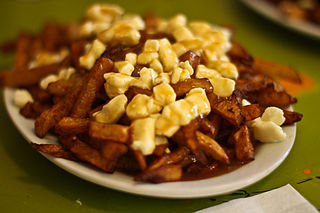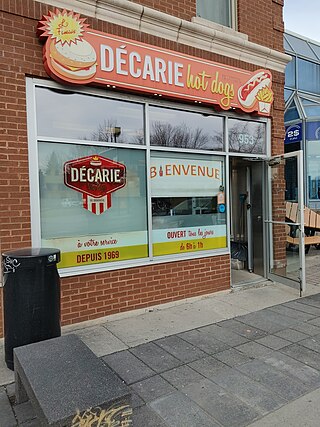
Poutine is a dish of french fries and cheese curds topped with a brown gravy. It emerged in Quebec in the late 1950s in the Centre-du-Québec region, though its exact origins are uncertain, and there are several competing claims regarding its invention. For many years, it was used by some to mock Quebec society. Poutine later became celebrated as a symbol of Québécois culture and the province of Quebec. It has long been associated with Quebec cuisine, and its rise in prominence has led to its growing popularity throughout the rest of Canada.
Alimentation Couche-Tard Inc., or simply Couche-Tard, is a Canadian multinational operator of convenience stores. The company has 14,302 stores across Canada, the United States, Mexico, Ireland, Norway, Sweden, Denmark, Estonia, Latvia, Lithuania, Poland, Russia, Japan, China, and Indonesia. The company operates its corporate stores mainly under the Couche-Tard, Circle K, and On the Run brands but also under the affiliated brands Mac's Convenience Stores, go!, 7-jours, Dairy/Daisy Mart, Becker's and Winks.

The cuisine of Québec is a national cuisine in the Canadian province of Québec. It is also cooked by Franco-Ontarians.

Canadian cuisine consists of the cooking traditions and practices of Canada, with regional variances around the country. First Nations and Inuit have practiced their culinary traditions in what is now Canada for at least 15,000 years. The advent of European explorers and settlers, first on the east coast and then throughout the wider territories of New France, British North America and Canada, saw the melding of foreign recipes, cooking techniques, and ingredients with indigenous flora and fauna. Modern Canadian cuisine has maintained this dedication to local ingredients and terroir, as exemplified in the naming of specific ingredients based on their locale, such as Malpeque oysters or Alberta beef. Accordingly, Canadian cuisine privileges the quality of ingredients and regionality, and may be broadly defined as a national tradition of "creole" culinary practices, based on the complex multicultural and geographically diverse nature of both historical and contemporary Canadian society.

Emmett Mathias Joseph Johns, was a Canadian priest and humanitarian. He was the founder of Dans la Rue, a homeless shelter and support group for street youth in Montreal, Quebec.

The Montreal hot dog, also known as a steamie, is one of several variations of hot dogs served as a fast food staple at restaurants and diners in Montreal and other parts of Quebec.

The Montreal Star was an English-language Canadian newspaper published in Montreal, Quebec, Canada. It closed in 1979 in the wake of an eight-month pressmen's strike.

La Belle Province is a well-known fast food restaurant chain in the province of Quebec, Canada. It is also known as LBP, LB, BP, La Belle Pro, Belle Pro, La Belle or Labelle, as nicknames. Each location is independently franchised; some are open 24 hours a day.
La Fin du monde est à 7 heures was a Quebec television comedy series, which aired on TQS from 1997 to 2000. The show was originally broadcast daily at 7 p.m., but was later moved to the 6 p.m. slot and ended its run in the 10 p.m. slot, with no name change. Although literally a reference to the program's original time slot, the title was also a pun; in spoken Quebec French, the pronunciation of à sept heures is virtually indistinguishable from à cette heure.

The Montreal Pool Room is a well-known and well-regarded greasy spoon restaurant, located in the city's former red-light district on Saint Laurent Boulevard, in Montreal, Quebec, Canada. The restaurant has been open since 1912 and is known for its "underground allure", described by some as being a "seedy goodness". Though called a "pool room" by name, it no longer has a pool table.

MTY Food Group Inc. is a Canadian franchisor and operator of numerous casual dining, fast casual, and quick service restaurants operating under more than 70 brand names, some of them through wholly owned subsidiaries. Headquartered in the Montreal borough of Saint-Laurent, Quebec, the number of outlets carrying MTY brands reached 5,500 in 2017. Stanley Ma is the group founder, President and CEO. MTY Food Group's brands include Thaï Express, Country Style, Groupe Valentine, Vanelli's, Extreme Pita, Cultures, La Crémière, Sushi Shop, Veggirama, Caferama, O'burger, Tiki Ming, Vie & Nam, Au Vieux Duluth Express, FranxSupreme, ChicknChick, Croissant Plus, Koya Japan, Kim Chi, Panini, Tandori, Tutti Frutti, Villa Madina Mediterranean Cuisine, Sukiyaki, Taco Time, Yogen Früz, and the Canadian branch of TCBY.
Da Gryptions is a Canadian hip hop band from Montreal, formed in 2009. The band consists of Future Shark (vocals), Dark Science (vocals), Apsobibi, and Ripples (a.k.a. Stephen Ramsay of Young Galaxy and features the studio skills of Liam O'Neil, formerly a member of The Stills.

Moishe's Steakhouse, in its original incarnation, was one of the oldest restaurants in Montreal, Quebec, Canada. Founded in 1938 by Moishe Lighter, it ran in Montreal's The Main district for 83 years. The restaurant had been in its location at 3961 Saint Laurent Boulevard since its founding, in an area that was the historic Jewish quarter.

Montreal-style smoked meat, Montreal smoked meat or simply smoked meat in Quebec is a type of kosher-style deli meat product made by salting and curing beef brisket with spices. The brisket is allowed to absorb the flavours over a week. It is then hot smoked to cook through, and finally is steamed to completion. This is a variation on corned beef and is similar to pastrami.

Smoke's Poutinerie is a Canadian poutine restaurant franchise founded by Ryan Smolkin.
The Main Deli Steak House, also known simply as Main Deli or The Main, was a delicatessen and steakhouse located on Saint Laurent Boulevard in Montreal, Quebec, Canada.

Décarie Hot Dogs, founded in 1969, is a diner counter restaurant located on Décarie Boulevard in the Saint-Laurent district of Montreal, Quebec, Canada. It specializes in hot dogs and french fries.

La Poutine Week is an annual food festival which celebrates poutine, a Québécois dish of french fries, cheddar cheese curds and brown gravy, which is popular throughout Canada and has spread internationally. It is the world's largest poutine festival, with over 700 restaurants serving poutines to more than 350,000 customers. The festival has been held 1–7 February, with double-sized 1–14 February editions beginning in 2022.

Canada has many of its own pizza chains, both national and regional, and many distinctive regional variations and types of pizza resulting from influences of local Canadian cuisine.


















